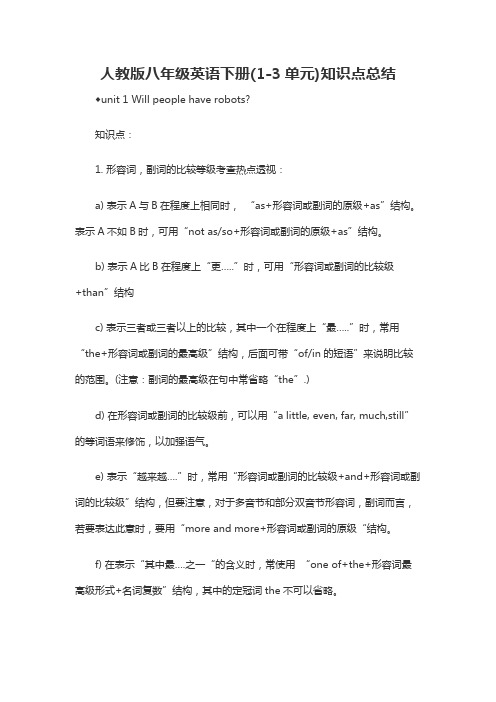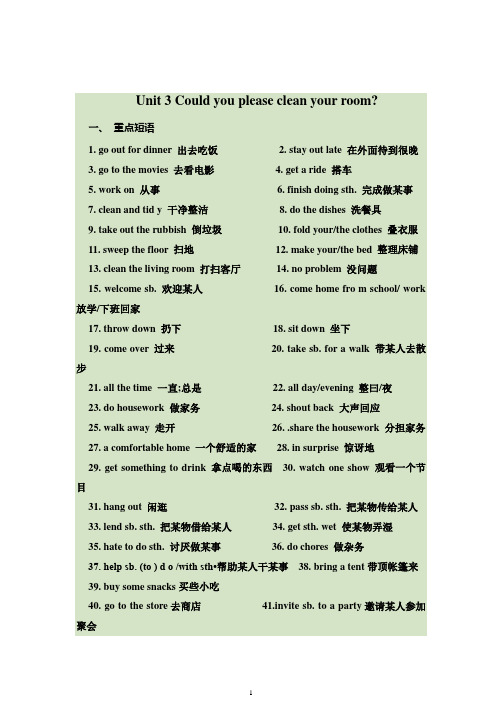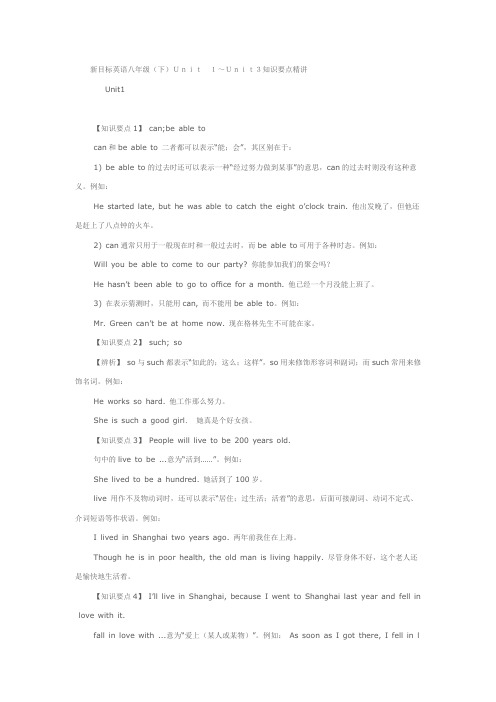2014年人教新目标八年级英语下册前三单元知识总结
新目标人教版英语八年级下册unit3知识点+练习题

新目标人教版英语八年级下册u n i t3知识点+练习题-CAL-FENGHAI.-(YICAI)-Company One1Unit3 Could you please clean your room?Section A(1a-2d)学习目标:1.掌握1a-2d的词语2.学习提出礼貌的请求和请求允许;3.学会使用句型:Could you please...和Could I...;4.学习重点:掌握一些家务活动相关的动词短语。
掌握情态动词could的用法和助动词do的用法。
5.学习难点:掌握情态动词could的用法和助动词do的用法【一】自主学习明确目标1 试读单词,解决语音问题,联系有关旧单词2 查阅下面的短语动词1) 出去吃饭_______________ 2)在外面待到很晚_______________3)去看电影_______________ 4)搭车_______________5)完成做某事_______________ 6)干净整洁_______________ 7)洗餐具_______________ 8)倒垃圾_______________9)叠衣服_______________ 10)扫地_______________ 3.观察以上词组的构成方式:【语言点】1. —Peter, could you please take out the trash请你把垃极倒掉好吗—Sure, Mom.可以,妈妈。
—Could you please do the dishes 请洗盘子好吗—Sorry, I can’t. I have to do my homework.抱歉,我不能。
我得做作业。
(1)在表示请求帮助或请求允许的疑问句中,常用could代替can,以表示礼貌,委婉或不确定的语气,而can则不具备这些语气。
这种情况下不能把could看作can的过去式。
以上两句中用could是为了表示礼貌的请求。
人教版版八年级下册英语一至三单元知识点

12. be in trouble遇到麻烦,make trouble制造麻烦,
have trouble (in) doing sth. =have difficulties (in) doing sth做......有麻烦。
It’s difficult for one to get used to another country’s habit.
18. When his water run out, he knew that he would have to do something to save his own life.
have a cough咳嗽have a stomachache胃疼,肚子疼have a toothache牙疼have a headache头疼
3.身体部位+ache(疼痛)构成新的复合词
stomach+ache=stomachache head+ache=headache tooth+ache=toothache back+ache=backache后背痛
13. right away=right now=at once,意为马上。
14.【复习】advice [不可数名词]劝告,建议,向„征求意见,give sb. advice on sth.就某事给某人建议;advise
[动词] advise sb. to do sth.建议某人做某事
advise sb. doing sth.
物:sth. run out.某物用尽了。人:sb. run out of sth.人用尽了某物。He run out of all his money last night.
人教版八年级英语下册(1-3单元)知识点总结

人教版八年级英语下册(1-3单元)知识点总结◆unit 1 Will people have robots?知识点:1. 形容词,副词的比较等级考查热点透视:a) 表示A与B在程度上相同时,“as+形容词或副词的原级+as”结构。
表示A不如B时,可用“not as/so+形容词或副词的原级+as”结构。
b) 表示A比B在程度上“更…..”时,可用“形容词或副词的比较级+than”结构c) 表示三者或三者以上的比较,其中一个在程度上“最…..”时,常用“the+形容词或副词的最高级”结构,后面可带“of/in的短语”来说明比较的范围。
(注意:副词的最高级在句中常省略“the”.)d) 在形容词或副词的比较级前,可以用“a little, even, far, much,still”的等词语来修饰,以加强语气。
e) 表示“越来越….”时,常用“形容词或副词的比较级+and+形容词或副词的比较级”结构,但要注意,对于多音节和部分双音节形容词,副词而言,若要表达此意时,要用“more and more+形容词或副词的原级“结构。
f) 在表示“其中最….之一“的含义时,常使用“one of+the+形容词最高级形式+名词复数”结构,其中的定冠词the不可以省略。
g) 如果强调“两者中比较…的(一个)”的意思时,可使用“the+形容词比较级+其它”结构。
h) 表示“越….越….”, 可使用“the+形容词或副词的比较级,the+形容词或副词的比较级”结构。
2 .一般将来时a) 一般将来时的构成:由助动词shall或will加动词原形构成,shall用于第一人称。
在口语中,will在名词或代词后常简略为’ll,will not常简略为won’t。
这个时态的肯定,否定和疑问结构可表示如下:肯定句否定句疑问句I (We)shall(will) go.You(He, She, They) will go. I(We)shall(will) not go.You(He, She, They)will not go. Shall I(we) go?Will you (he, she, they) go?用”be going to +动词原形”也可表示将来时,表示将要发生的事,打算或决定要做的事。
新目标八年级英语下册三四单元基础总结

——从九点钟起我一直在滑冰。 —I've been skating for_five_hours. ——我已经滑了五个小时了。(Unit 6) 【辨析】 since与for ①since意为“自„„以来”,所表示的是一个时间点,
既可作介词,后接时间名词或短语;也可作连词,引导时间状
语从句,前面的谓语动词或主句的谓语动词必须是延续性的且 句子用完成时态,从句用一般过去时态。如: Mr.Brown has worked in that factory since 1998. 自1998年以来,布朗先生就在那家工厂工作了。
风中徐徐升起。
4.My mom says I have to stop,because we've run_out_of_room to store them. 妈妈说我必须停下来,因为我们已经没有空间去储存它们 了。(Unit 6)
(1)【辨析】run out of与run out
①run out of“用完;用尽”,主语通常是人,与use up意思 相同;run out of还可以表示“从……跑了出来”。 ②run out“(时间、金钱、事物等)用尽;用完”,此时主语 是时间、金钱等。 Tom has run out of all the money.
二、用所给单词的适当形式填空(10分)
interested interesting 1.Jack is ___________ in the ___________
(interest)computer games.
injured 2.The football player got ________ (injure)in the match.
②“比较级+and+比较级”结构,表示“越来越……”。 ③比较级前可用much,a lot,still,a little,even等修饰 ,来加强比较的语气。 Lily's room is bigger than mine.莉莉的房间比我的大。
人教版新目标英语八年级下册Unit3重点短语和基础习题

Unit 3 Could you please clean your room?一、重点短语1. go out for dinner 出去吃饭2. stay out late 在外面待到很晚3. go to the movies 去看电影4. get a ride 搭车5. work on 从事6. finish doing sth. 完成做某事7. clean and tid y 干净整洁8. do the dishes 洗餐具9. take out the rubbish 倒垃圾10. fold your/the clothes 叠衣服11. sweep the floor 扫地12. make your/the bed 整理床铺13. clean the living room 打扫客厅14. no problem 没问题15. welcome sb. 欢迎某人16. come home fro m school/ work 放学/下班回家17. throw down 扔下18. sit down 坐下19. come over 过来20. take sb. for a walk 带某人去散步21. all the time 一直;总是22. all day/evening 整曰/夜23. do housework 做家务24. shout back 大声回应25. walk away 走开26. .share the housework 分担家务27. a comfortable home 一个舒适的家28. in surprise 惊讶地29. get something to drink 拿点喝的东西30. watch one show 观看一个节目31. hang out 闲逛32. pass sb. sth. 把某物传给某人33. lend sb. sth. 把某物借给某人34. get sth. wet 使某物弄湿35. hate to do sth. 讨厌做某事36. do chores 做杂务37. help sb. (to ) d o /with sth•帮助某人干某事38. bring a tent带顶帐篷来39. buy some snacks买些小吃40. go to the store去商店41.invite sb. to a party邀请某人参加聚会42. make sb. do sth. 使某人做某事43. enough stress足够的压力44. a waste of time浪费时间45. in order to为了46. get good grades取得好成绩47. mind doing sth. 介意做某事48. depend on依赖;依靠49.develop children ’ s independence 发展孩子的独立性50. look after/take care of 照顾;照看51.do one’ s part in (doing) sth.做某人分内的事一.根据句意及汉语提示补全句子1. Could you ________________ (叠) your clothes when you were five?2. Father usually does the ________________(洗餐具) after meal at home.3. Every day you should help Mother ________________(倒垃圾)。
新人教版八年级英语下册第三单元知识点

新人教版八年级英语下册第三单元知识点第一篇:新人教版八年级英语下册第三单元知识点Unit3 Could you please clean your room? 一.情态动词could 的用法1.提出礼貌的要求 Could you please(not)do sth ?请你(做)......好吗?用于提出请求,希望得到对方的肯定回答,说话的语气比较客气委婉。
Could 不是can的过去式,是委婉、礼貌的说法。
回答用can.肯定回答:Yes,sure./ Yes, I can./Of course,I can./ Certainly./No problem./ With pleasure.否定回答:Sorry , I can’t / I’m afraid I can’t.I have to …,I’m going to…(说明理由)2.表示请求许可Could I do a sth? 我可以做......吗?肯定回答:Yes, you can./ Yes ,please / Of course / Certainly./ No problem.否定回答:Sorry , you can’t / I’m afraid you can’t.3.could 为can的过去式,表示过去的能力。
= was / were able toSection A 1.take out the rubbish把垃圾带出去 2.do the dishes = wash the dishes 洗碗碟 3.fold your clothes折衣服 4.sweep the floor扫地 5.make your bed整理床铺6.clean the living room打扫起居室7.do some washing/ shopping/ cleaning洗衣服/ 购物/ 做清洁8.go out for dinner出去吃晚饭 9.go to the movies去看电影10.stay out late/ until nine呆到很晚/ 呆到9点钟 11.get a ride 撘车12.give sb a ride to town开车送sb到镇上13.need to do something需要做…… 14.have to do something不得不做……15.help out with a few things帮助做些事情16.at least 至少,多指数量或程度上的最低限度。
人教版新目标初中英语八年级下册Unit3学霸笔记

Unit3 Could you please clean your room?
【词汇解析】
when_过去/现在_
当…从句
while__进行时__
从句
waste [weɪst] v. 浪费,消耗
a waste of time浪费时间
in order to 目的是,为了
7.in order (not)to do sth. 为了(不)做某事
provide [prə'vaid] v. 提供,供给,供应
1
2
重点句型
1.finish (做完) doing sth mind (介意)
2. learn( how) to do sth 学习(怎样)做某事 learn sth.by oneself 自学某事
3.make(使) sb. do sth. 使某人做某事 Let (让)
4. .be pleased with sb.对某人满意 6.The +比较级,the+比较级 越......,就越.....
7. have time to do sth.有时间干某事
8.lend sb. sth.=lend sth. to sb. 把某物借给某人
9.try (not) to do sth 尽力(不)做某事
10. hate to do sth. =hate doing sth.讨厌做某事 11.do one’ s part in (doing ) sth. 做某人分内的事 12 There is no need for sb. to do sth. 对某人来说没必要干某事
13.take sb. for a walk 带某人去散步 14.Could you please do sth. 你能干某事吗?
3。
新目标英语八年级(下)Unit 1~Unit3知识要点精讲

新目标英语八年级(下)Unit1~Unit3知识要点精讲Unit1【知识要点1】can;be able tocan和be able to 二者都可以表示“能;会”,其区别在于:1) be able to的过去时还可以表示一种“经过努力做到某事”的意思,can的过去时则没有这种意义。
例如:He started late, but he was able to catch the eight o’clock train. 他出发晚了,但他还是赶上了八点钟的火车。
2) can通常只用于一般现在时和一般过去时,而be able to可用于各种时态。
例如:Will you be able to come to our party? 你能参加我们的聚会吗?He hasn’t been able to go to office for a month. 他已经一个月没能上班了。
3) 在表示猜测时,只能用can, 而不能用be able to。
例如:Mr. Green can’t be at home now. 现在格林先生不可能在家。
【知识要点2】such; so【辨析】so与such都表示“如此的;这么;这样”,so用来修饰形容词和副词;而such常用来修饰名词。
例如:He works so hard. 他工作那么努力。
She is such a good girl.她真是个好女孩。
【知识要点3】People will live to be 200 years old.句中的live to be ...意为“活到……”。
例如:She lived to be a hundred. 她活到了100岁。
live 用作不及物动词时,还可以表示“居住;过生活;活着”的意思,后面可接副词、动词不定式、介词短语等作状语。
例如:I lived in Shanghai two years ago. 两年前我住在上海。
Though he is in poor health, the old man is living happily. 尽管身体不好,这个老人还是愉快地生活着。
- 1、下载文档前请自行甄别文档内容的完整性,平台不提供额外的编辑、内容补充、找答案等附加服务。
- 2、"仅部分预览"的文档,不可在线预览部分如存在完整性等问题,可反馈申请退款(可完整预览的文档不适用该条件!)。
- 3、如文档侵犯您的权益,请联系客服反馈,我们会尽快为您处理(人工客服工作时间:9:00-18:30)。
Unit1 What’s the matter?1.What’ s the matter with you?= What’s the trouble with you?= What’ s wrong with you?你怎么了?have a cold 感冒了have a stomachache 患胃痛have a sore back. 背痛have a sore throat 患喉咙痛have a fever 发烧have a cold 感冒have a stomachache 患胃痛have a toothache患牙痛have a headache 患头痛2.lie down and rest 躺下来休息3.hot tea with honey 加蜂蜜的热茶4.see a dentist 看牙医5.take one’ s temperature 量体温6.feel very hot 感到很热7.all weekend 整个周末8.in the same way 以同样的方式9.go to a doctor 看医生10.go along 沿着……走11.on the side of the road 在马路边12.shout for help 大声呼救13.without thinking twice 没有多想14.get off 下车get on 上车15.have a heart problem 有心脏病16.to one’ s surprise 令某人吃惊的是17thanks to 幸亏,由于18.on time 准时/in time 及时19.save a life 挽救生命20.get into trouble 陷入困境21.right away/at once 立刻;马上22.because of 因为…23.get out of 离开;从……出来24.hurt oneself 受伤24.fa ll down 摔倒25.feel sick 感到恶心26.have problems breathing 呼吸困难27.mountain climbing 登山运动ed to do sth 过去常常做某事29.be /get used to doing sth 习惯于做某事30.run out (of) 用完;用尽31.so that 以便32.so. . . that 如此… …以至于…33. be in control of 掌管;管理34.keep on doing sth. 继续或坚持做某事35.take risks 冒险36.give up doing sth=stop doing sth 放弃做某事37.see sb. doing sth 看见某人正在做某事see sb. do sth 看见某人做了、常做某事38.lie/lai/v. (lay/lei/ )躺;平躺39.24-year-old 24岁的40.to one’s surprise 使某人吃惊的是41. in surprise 吃惊地42.agree with sb. 同意某人43. agree to do sth 同意做某事44.all the time 一直45.think about 考虑46.be in trouble 处于困境中47.have trouble/problems/difficulties (in) doing sth做某事有困难48sick adj.“生病的”,既可放be (系动词)后作表语,也可放n.前作定语。
ill adj.“生病的”,只能放be (系动词) (ill adj → illness n.“病;疾病”)49. be interested in(doing sth.) = take/have an interest in(doing sth.)对……感兴趣places of interest 名胜50.by oneself= alone 单独的51.the importance of……的重要性性52.decide to do sth决定做某事=make a decision 做决定(to do sth.)53.be not the same as = be different from 与......不同54.die v. death n. 死,死亡dead adj. 死的dying adj. 将死的1( ) What’s ____ with you? A. trouble B. the matter C. the wrong D. matter2【2011.云南昆明】27. —What’s the matter with Tina?—_______________.A. She is away.B. She is cool.C. She has a sore throat.D. She should take some medicine3【2013山东莱芜】—Tony, What’s ___ matter with you?—I have _____ toothache.A. a; theB. the; aC. /; theD. the; /4 ( ) —What do you think of the lecture of Li Yang’s Crazy English?—I think it’s _____ , but someone thinks it’s much too _____.A. wonderful enough; boredB. enough wonderful; boringC. wonderful; enough; boringD. enough wonderful ; bored5【2013连云港】3— I'd like a cup of black coffee. What about you, Maggie?— I prefer coffee ________ sugar.6 ( ) You ____ be quiet when you are in the reading room.A. shouldB. shouldn’tC. canD. can’t7【2013重庆】30.Hurry up,or you ____catch the train.A.can’t B.needn’t C.mustn't D. shouldn’t8【2013安徽】You _____ drive your car so fast. It’s very dangerous.A. wouldn’tB. shouldn’tC. couldn’tD. mightn’t9( ) David needs ______ a good rest.A. hasB. to haveC. haveD. having10【2013广东广州】20.—Must I finish my homework now?—No, you ______. You can go home now.A. needn’tB. mustn’tC. shouldn’tD. can’t11【2011襄阳】29.---- Would you mind turning ____ the light? It’s too dark here.---- OK. Wait a minute, please.A. overB. onC. offD. down12【2013黑龙江绥化】She is a _____ girl with two big eyes.A. Six-years- oldB. six-year - oldC. Six years old13【2012江苏徐州】Don’t forget to take your bag when you ___ the bus.A. get offB. take offC. turn offD. put off14 We are ____________at the _____________news.(surprise)15( ) ___his surprise, she succeeded in climbing up the high mountain.A. AtB. ToC. InD. On16 ( ) —I think English is more useful than Chinese.—I don’t ____ you. They are both useful.A. get on withB. catch up withC. talk withD. agree with17【2013呼和浩特】74. _____ her husband,she has now become a famous film star.A. BecauseB. Thanks toC. Thanks forD. With the help18【山东东营】Tom didn’t go to school _____ this morning because he overslept.A. at onceB. on timeC. in timeD. right away19I think her (ill) is very serious. 我认为她的病是很严重。
20( ) ②The ___ girl was sent to hospital by her mother yesterday.A. sickB. illC. goodD. well21 ( ) This book is very _____ and I am ____ in it.A. interest; interestB. interesting; interestedC. interested; interestedD. interested; interested22【2013淄博】7. ___ a teacher, Mr. Wang thinks it's very important to teach the students how to learn.A. FromB. WithC. AsD. Of23【2013四川雅安】20. My parents getting up early on weekdaysA. used toB. be used toC. was used toD. are used to24【2013黑龙江龙东】30. She live with her grandparents , bu t she doesn’t now.A. used toB. is used toC. was used to25【2013贵州安顺】18. She ____ live alone. But she _____ living alone because she feels lonely.A. used to; doesn’t used toB. is used to; was used toC. used to; is not used toD. was used to; doesn’t used to26( ) ①We couldn’t drink the milk ___ it was too hot.( ) ②He can’t go to school ______illness.( )③The old man was too tired ______ doing the farm work.A. because B .because of C. instead D. instead of27( ) He did the work all by himself.A. alreadyB. togetherC. aloneD. lonely28Anyone can see the ____________(important) of good health.29Tom decided _________________(study) English well.30【2012曲靖中考】-- The national hero Wu Bin , a bus driver, hardly had time to think about himself when in danger.-- Yes, His ____ is starting to make people think a lot.A. dieB. deathC. deadD. died31( ) Would you mind ____more slowly? I can’t follow you.A. speakB. spokeC. spokenD. speaking32【2013江苏连云港】11. It was a difficult time for the quake-hit victims in Ya'an, but they didn't ________ hope.A. give up B. give off C. give in D. give out33We use Internet __________(find) information.34My grandpa is used ___________(live) in country.Unit2.I’ll help to clean up the city parks一.短语英汉互译1.cheer up fix up = repair put up call up clean up give up (doing sth.) set up_______2put off cut off 3give away put away 4run out of5take after (be similar to … be like look like) 6.look after 7ome up with =think of /think up8.hand out=give out9..care for…(well) 照顾(好)= look after…(well)/take (good)care of..10.try out 11. make a difference to …对..造成影响12. used to do sth. be/get used to doing sth.13.⑴put off doing sth. 推迟做…⑵feel lonely 感到孤独(指内心)live alone 独自居住(指周围没别人)⑶alone独自= (all ) by oneself ⑷raise money for homeless people为无家可归的人筹钱⑸give out food 分发食物⑹put up signs 张贴标志⑺the feeling of satisfaction满足感⑻the look of joy 愉快的表情⑼the owner of the shop 店主⑽be excited about …对…感到兴奋⑾because of kindness 因为善良⑿help sb. out 帮助某人解决困难⒀at the age offour在四岁时=when he was four years old⒁at the same time 同时⒂less lucky 更不幸运的⒃worry about =be worried about 担心…⒄stop doing sth停止做…stop to do sth.停下来去做…⒅in their free time 在他们的空闲时间⒆use hands easily容易地使用手⒇at once =right away立刻,马上(21)a friend of mine =one of my friends我的一位朋友(22)have difficulties(in) doing sth.=have trouble (in) doing sth./have problems (in) doing sth.做某事有困难(22)be able to do sth. 能做某事be unable to do sth.不能做某事(23)best wishes最好的祝福(24)sendsb. sth. =send sth. to sb.寄、发送给某人某物(25)the idea of ……的注意(26)plan to do sth.=make plans to do sth.计划做...(27.)some interests 一些兴趣a great place of interest名胜古迹interest sb.使某人感兴趣be interested in…对..感兴趣an interesting job.一份有趣的工作二.动词不定式动词不定式用法小结:1. 作宾语。
